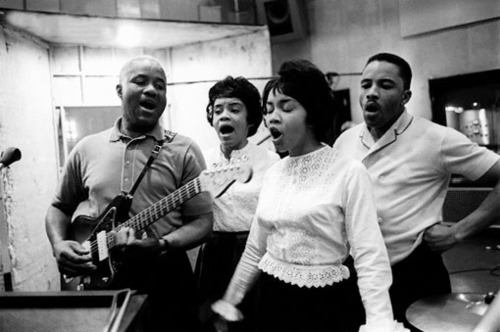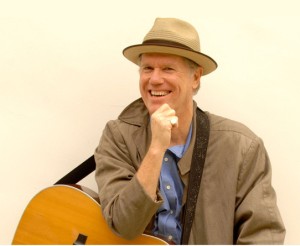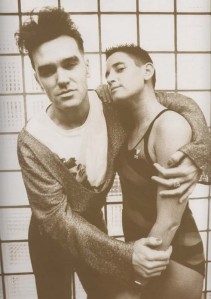
As anyone with their eyes on the prize knows, the 60th anniversary of the historic March on Washington for Jobs and Freedom was on August 28, 2023. Among those assembled to help Dr. King push forward his dream of racial harmony and economic justice was Len Chandler (often overlooked in the history of civil rights work), one of the voices in a trio that day which included Bob Dylan and Joan Baez (Chandler appears at about 17 minutes into the following clip, though the whole 25 minutes is worth your time). Unfortunately, I come here today with a heavy heart to belatedly report that Chandler died at home in Los Angeles, on August 28, 60 years to the day of the march.
It was a blessing to have interviewed Len on several occasions for the purpose of documenting his story. I was invited to the home he shared with his wife Olga James, to break bread with him, and to participate in several community functions and political gatherings where he was still singing for freedom in the 21st Century. My deepest condolences to all who loved him. I did not know him well, but his work has continued to move and motivate me, long after first making contact with him more than a decade ago.
It was hoped that Chandler and I would be visiting the Bob Dylan Center in Tulsa this year, to deliver a panel on singing, songwriting, racial justice and voting rights, to coincide with the publication of my essay commissioned by the Center on Chandler. But none of that was to be. Timing, as it’s said, is everything. And racism is still very much alive, very much afoot in America, 2023.
The following is a repost from my previous posts on Chandler
Chandler would march with Dr. King and travel throughout the South in the name of voter registration, informing rural Southerners of their polling rights, often at great risk to his own life. His poems were recognized by Langston Hughes, he wrote the folk standard “Green, Green Rocky Road” with poet Bob Kaufman, and recorded two albums for Columbia Records, but little is known about him or his life. I sought out Chandler when I wrote Keep on Pushing, my text that tracks the origins and evolution of freedom music, and its roots in African American resistance and liberation movement.
Originally from Akron, Ohio, and studying on scholarship at Columbia in the ’50s, Chandler made his way to Greenwich Village folk music by accident: Lured to the sounds of Washington Square Park by the downtown youths he was mentoring, he easily fell into the scene with his natural ear for songwriting and his familiarity with the songs of Lead Belly, Big Bill Broonzy, and Woody Guthrie. Following a performance at the popular Village coffeehouse, the Gaslight Cafe, Chandler landed a contract to go to Detroit, writing and performing topical songs for local television. A few months later, when he returned to New York, the folk thing was in full swing: Bob Dylan was the latest arrival to town and the pair started to trade ideas and songs.
“I hadn’t yet begun writing streams of songs like I would, but Len was, and everything around us looked absurd—there was a certain consciousness of madness at work,” wrote Dylan in his book Chronicles. Chandler remembers it like this in Keep on Pushing: “The first song I ever heard of Dylan’s was ‘Hey ho, Lead Belly, I just want to sing your name,’ stuff like that.” Dylan used Chandler’s melody for his song, “The Death of Emmett Till.” “Len didn’t seem to mind,” Dylan wrote.
Chandler went on to record two albums for Columbia: To Be a Man and The Loving People. He continued to work as a topical songwriter, a peace and civil rights advocate, and as a songwriting teacher; his tour of Pacific Rim bases with Donald Sutherland, Jane Fonda, Holly Near and Paul Mooney was documented in the Francine Parker film, FTA, a must-see for anyone interested in US history and anti-war efforts within military ranks. Catch a glimpse of Chandler at the end of this trailer for the film:
It was an extreme privilege (and I have since found out a rare opportunity) to meet one of the true unsung heroes of singing activism (as well as his wife Olga James, a pioneering performer in her own right), and have him tell his story to me. Though largely retired from performing, he remains well- informed on human rights, politics, and the arts and will step up and step out for civil rights. You can read a portion of our talks in Keep on Pushing, and someday I will post the complete unedited transcripts, though for now, enjoy the voice of Chandler from back in the day, when singing was a huge part of moving the movement forward.
Filed under: anti-capitalist, anti-racist, anti-war, Arts and Culture, Black Power,, California, Civil Rights, Folk, racism, Bob Dylan, Len Chandler


 Hello faithful family of friends and readers: First things first, I wish you health and safety in these troubling times. I’ve been keeping my head down, safe distancing and generally following the recommendation of my state and local leaders to shelter in place. Here in San Francisco, we went on the unfortunately termed “lockdown” at midnight on March 16 in an effort to “flatten the curve.” There is so much left to learn and know about this virus. I will continue to cover its impact from my usual arts and cultural perspective as long as necessary.
Hello faithful family of friends and readers: First things first, I wish you health and safety in these troubling times. I’ve been keeping my head down, safe distancing and generally following the recommendation of my state and local leaders to shelter in place. Here in San Francisco, we went on the unfortunately termed “lockdown” at midnight on March 16 in an effort to “flatten the curve.” There is so much left to learn and know about this virus. I will continue to cover its impact from my usual arts and cultural perspective as long as necessary.
 A righteous pundit, Loudon Wainwright III has been pursuing music since the late ’60s, debuting with a self-titled album in 1970. Aside from his honest and deeply felt songs on relationships and life circumstances, he’s long written satirical work, a style he calls “musical journalism,” best demonstrated over an album’s length on 1999’s Social Studies (he sticks it to O.J. Simpson, Tonya Harding, and Jesse Helms). For awhile he was the in-house songsmith for Nightline and is occasionally commissioned songs for NPR. His latest is a hilarious nightmare vision of this year’s U.S. Presidential election.
A righteous pundit, Loudon Wainwright III has been pursuing music since the late ’60s, debuting with a self-titled album in 1970. Aside from his honest and deeply felt songs on relationships and life circumstances, he’s long written satirical work, a style he calls “musical journalism,” best demonstrated over an album’s length on 1999’s Social Studies (he sticks it to O.J. Simpson, Tonya Harding, and Jesse Helms). For awhile he was the in-house songsmith for Nightline and is occasionally commissioned songs for NPR. His latest is a hilarious nightmare vision of this year’s U.S. Presidential election.




